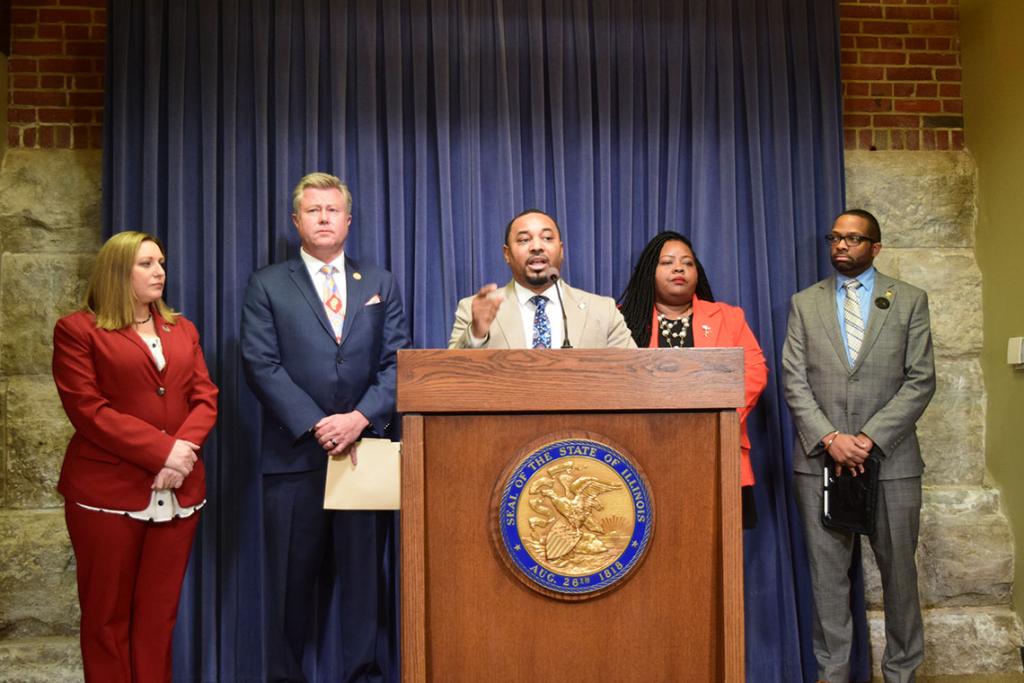
By LILY CAREY
For Capitol News Illinois and Medill Illinois News Bureau
[email protected]
SPRINGFIELD – For the second legislative session in a row, Sen. Willie Preston, D-Chicago, is pushing to ban several chemicals from Illinois food items.
But this time, Preston and his bipartisan backers have momentum from the federal government on their side.
Senate Bill 93, dubbed the Food Safety Act, passed out of the Senate Public Health Committee Tuesday. It would ban the use of four chemicals in Illinois foods: brominated vegetable oil, red dye No. 3, potassium bromate and propylparaben. All four of these substances have been the subject of scientific studies linking them to elevated health risks over time, and red dye No. 3 has been linked to cancer in animals.
Preston proposed an essentially identical bill last year, which passed the Senate with bipartisan support but was not called for a vote House. However, this year’s bill comes amid renewed national attention on the issue of food additives. In the past six months, the Food and Drug Administration has moved to ban two of the four substances that Preston’s bill proposes banning in Illinois — brominated vegetable oil and red dye No. 3.
The latter ban was enacted on Jan. 15, just days after Preston reintroduced the Food Safety Act. He said in a news release he intends to amend his bill in line with the recent federal bans.
“Manufacturers already have to comply with California standards, the EU (European Union) standards and now the FDA,” said Sen. Rachel Ventura, D-Joliet, at a Senate Public Health Committee hearing Tuesday. “We’re just asking them to make sure that our state, Illinois, also has those same safe foods.”
The two recent federal bans came “at lightning speed for the FDA,” Preston said. But the agency has a long history of missing deadlines, Melanie Benesh from the research and advocacy organization Environmental Working Group noted during the hearing.
The ban on red dye No. 3 has been in the works since 1990, when the FDA linked the chemical to cancer in lab rats and to behavioral problems in children. Meanwhile, all four substances that the Food Safety Act proposes banning have been outlawed in Europe and Australia for decades.
Given the FDA’s history of regulatory delays, Preston and other members of the Senate Public Health Committee said Illinois needs to take food additive bans into its own hands.
“I want the FDA to be a leader on this issue, but I cannot allow them the time to be a leader on this issue at the expense of the people of Illinois,” Preston said.
California became the first state to ban red dye No. 3 and brominated vegetable oil in 2023, and several other states are currently considering similar bans on food and color additives, including New Jersey, New York, Arkansas, Oklahoma and Missouri.
But some legislators believe the recent FDA bans could signal a change to the federal food regulatory process. Sen. Andrew Chesney, R-Freeport, was one of three to vote against the act in committee. He said food additive regulations should be left to the federal government and he expects President Donald Trump “will handle things differently” and move regulations along more quickly.
Sen. Seth Lewis, R-Bartlett, one of four Republicans to support the bill last session, is a chief co-sponsor on this year’s effort.
“Make no mistake — food, and the security of our food and the quality of our food, is a bipartisan issue,” Lewis said at a Wednesday news conference. “We need to make sure that what our children are eating helps them grow to be accomplished individuals here in our society. That is not partisan, that is bipartisan.”
Lily Carey is a graduate student in journalism with Northwestern University’s Medill School of Journalism, Media, Integrated Marketing Communications, and a Fellow in its Medill Illinois News Bureau working in partnership with Capitol News Illinois.Capitol News Illinois is a nonprofit, nonpartisan news service that distributes state government coverage to hundreds of news outlets statewide. It is funded primarily by the Illinois Press Foundation and the Robert R. McCormick Foundation.






